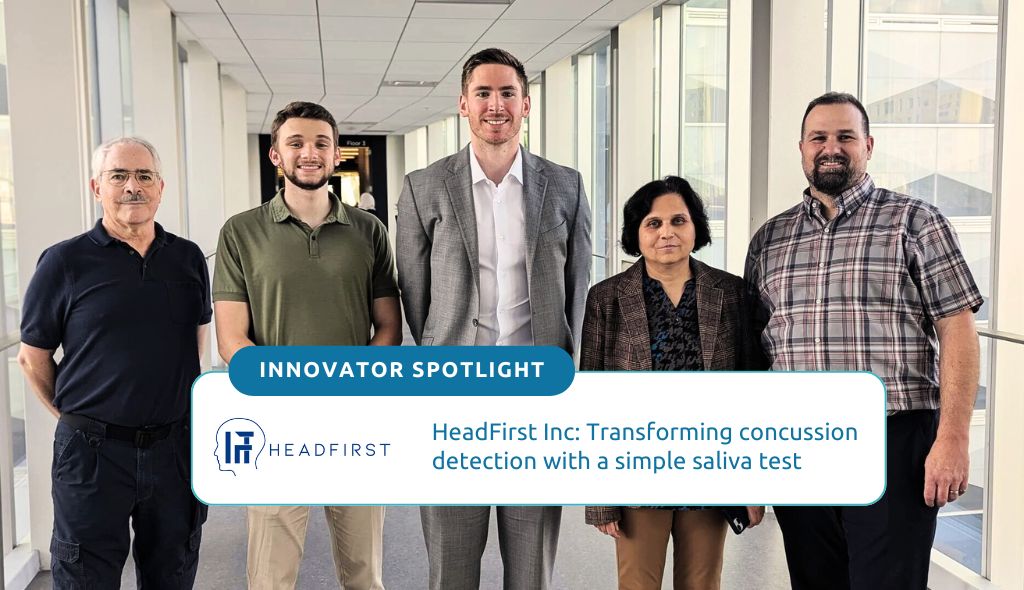Home » HeadFirst Inc: Revolutionizing Concussion Detection through an Innovative Saliva Test
HeadFirst Inc: Revolutionizing Concussion Detection through an Innovative Saliva Test

HeadFirst Inc., a biotechnology startup based in Waterloo, is pioneering a new method for concussion detection with a rapid, saliva-based test. Co-founded by Andrew Cordssen-David, a former varsity hockey player, and biomedical researcher Dr. Shazia Tanvir from the University of Waterloo, the company seeks to overcome the limitations evident in traditional concussion-testing methods, which are often subjective and can lead to misdiagnoses or athletes downplaying their symptoms.
Recognizing the need for a more reliable diagnostic tool, particularly given Cordssen-David's own experiences with head injuries, HeadFirst is developing a test that objectively identifies concussions through the detection of specific biomarkers released by the brain following trauma. These biomarkers cross the blood-brain barrier into saliva, allowing for quick results—similar to the familiar COVID-19 saliva tests. The test operates with a simple indicator system: two lines signify a positive concussive result, while one line indicates a negative.
Cordssen-David emphasized the urgency of their solution by pointing out that up to half of the current concussion tests fail to detect the injury. HeadFirst's saliva test aims to provide a timely and non-invasive alternative, which is particularly beneficial during high-impact sports events like hockey, football, and boxing. Early detection through this method can prevent athletes from returning to play too soon, consequently mitigating risks of severe long-term neurological issues.
The development of this test has been greatly supported by the University of Waterloo's Velocity incubator, which offers funding, laboratory space, and business mentorship to budding entrepreneurs. The collaboration includes expertise from the Faculty of Engineering at the university, particularly chemical engineering professors Marc Aucoin and Bill Anderson, who have refined the technology to enhance its accuracy and usability. Ongoing pilot trials with varsity athletes help establish baseline data and further refine the device’s performance.
Dr. Aucoin voiced the prospective impact of the test, suggesting that a reliable and accessible concussion screening could greatly enhance safety and health for athletes across all levels. The implications of HeadFirst's test extend beyond sports, presenting broader public health benefits by allowing for improved concussion management. Untreated concussions can lead to debilitating neurological conditions, including chronic traumatic encephalopathy, Parkinson's disease, and dementia. Through its proactive approach, the test aims to prevent premature returns to play and ensure proper treatment is administered.
As HeadFirst navigates the path toward regulatory approvals from Health Canada and the FDA, its innovative technology represents a significant advancement in athlete health protection. By establishing a more objective and rapid method of concussion detection, HeadFirst Inc. is positioned to play a transformative role in safeguarding the long-term brain health of not just athletes, but potentially individuals across various high-risk fields.
Innovation Factory
Innovation Factory is a business accelerator, dedicated to helping Ontario-based businesses launch, scale, and succeed. Supporting the Brant, Halton, Hamilton and Norfolk regions, we provide start-ups, and scaling companies with advisory services, training, mentorship, and strategic connections to help bring disruptive technologies to market, leverage intellectual property, increase revenues, attract investment and create jobs. Innovation can happen anywhere, our goal is to make it work everywhere. We work to elevate key industry sectors including advanced manufacturing, clean tech, information technology, smart transportation, life sciences & health care and social innovations. We are passionate about driving the growth of Ontario businesses like yours. Whether you are an entrepreneur bringing new ideas to market or a scaling business trying to get to the next level, we want to help.

